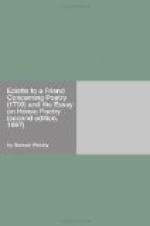In Ten Books.
ATTEMPTED BY SAMUEL WESLEY, M.A. Chaplain to the most Honourable JOHN Lord Marquess of Normanby, and Rector of Epwerth in the County of Lincoln.
Each Book Illustrated by necessary Notes, explaining all the more difficult Matters in the whole History: Also a Prefatory Discourse concerning Heroic Poetry.
The Second Edition, revised by the Author, and improved with the addition of a large Map of the HOLY-LAND, and a table of the principal matters.
With Sixty Copper-Plates, by the celebrated Hand of W. Faithorn.
LONDON: Printed for Charles Harper, at the Flower-de-Luce over against St. Dunstan’s Church, and are to be Sold by him, and Roger Clavel at the Peacock against Fetter-Lane, both in Fleetstreet, 1697.
THE PREFACE, Being an ESSAY on HEROIC POETRY
A Just Heroic Poem is so vast an Undertaking, requires so much both of Art and Genius for its Management, and carries such Difficulty in the Model of the Whole, and Disposition of the several Parts, that it’s no Wonder, if not above One or Two of the Ancients, and hardly any of the Moderns, have succeeded in their Attempts of this Nature. Rapin, and other Masters of Epic, represent it as an Enterprize so hardy, that it can scarce enter into the Mind of a wise Man, without affrighting him, as being the most perfect Piece of Work that Art can produce. That Author has many excellent Reflexions and Rules concerning it in his Discourse sur la Poetique; but Bossu is the first I’ve seen who has writ a just and perfect Tract thereon, wherein he has in a clear and Scholastic Method amass’d together most that’s to be found in Antiquity on that Subject, tho’ chiefly keeping to the Observations of Aristotle, which he drew from Homer, and who seems the first that reduced Poetry to an Art. That Author defines Epic, “An Artificial Discourse, in order to form the Manners by Instructions, disguis’d under the Allegories of some one important Action, recited in Verse, in a manner probable, diverting and admirable;” which he thus himself abridges, “’Tis a Fable, agreeably imitated on some important Action, recited in Verse in a manner that’s probable and admirable;” In which Definition are contain’d, as he afterwards explains it, the general Nature of Epic, and that double, Fable and Poem: The Matter, some one important Action probably feign’d and imitated: Its Form, Recitation or Narration: And lastly, its End, Instruction, which is aimed at in general by the Moral of the Fable; and besides in the particular Manners of the Persons who make the most considerable Figure in the Work.




